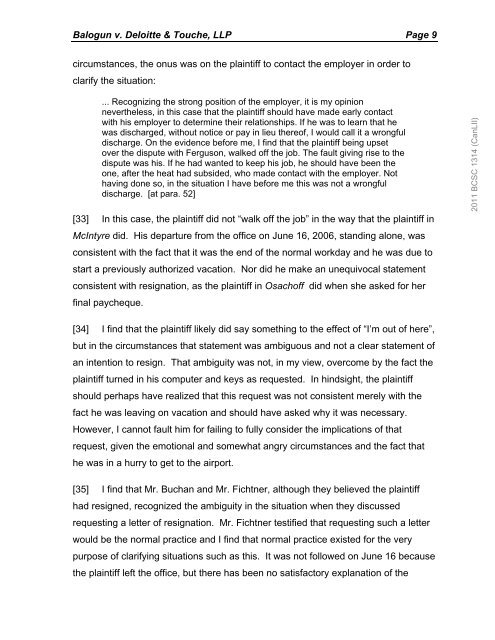FAQ's Cases - Stewart McKelvey
FAQ's Cases - Stewart McKelvey
FAQ's Cases - Stewart McKelvey
- No tags were found...
You also want an ePaper? Increase the reach of your titles
YUMPU automatically turns print PDFs into web optimized ePapers that Google loves.
Balogun v. Deloitte & Touche, LLP Page 9circumstances, the onus was on the plaintiff to contact the employer in order toclarify the situation:... Recognizing the strong position of the employer, it is my opinionnevertheless, in this case that the plaintiff should have made early contactwith his employer to determine their relationships. If he was to learn that hewas discharged, without notice or pay in lieu thereof, I would call it a wrongfuldischarge. On the evidence before me, I find that the plaintiff being upsetover the dispute with Ferguson, walked off the job. The fault giving rise to thedispute was his. If he had wanted to keep his job, he should have been theone, after the heat had subsided, who made contact with the employer. Nothaving done so, in the situation I have before me this was not a wrongfuldischarge. [at para. 52][33] In this case, the plaintiff did not “walk off the job” in the way that the plaintiff inMcIntyre did. His departure from the office on June 16, 2006, standing alone, wasconsistent with the fact that it was the end of the normal workday and he was due tostart a previously authorized vacation. Nor did he make an unequivocal statementconsistent with resignation, as the plaintiff in Osachoff did when she asked for herfinal paycheque.2011 BCSC 1314 (CanLII)[34] I find that the plaintiff likely did say something to the effect of “I’m out of here”,but in the circumstances that statement was ambiguous and not a clear statement ofan intention to resign. That ambiguity was not, in my view, overcome by the fact theplaintiff turned in his computer and keys as requested. In hindsight, the plaintiffshould perhaps have realized that this request was not consistent merely with thefact he was leaving on vacation and should have asked why it was necessary.However, I cannot fault him for failing to fully consider the implications of thatrequest, given the emotional and somewhat angry circumstances and the fact thathe was in a hurry to get to the airport.[35] I find that Mr. Buchan and Mr. Fichtner, although they believed the plaintiffhad resigned, recognized the ambiguity in the situation when they discussedrequesting a letter of resignation. Mr. Fichtner testified that requesting such a letterwould be the normal practice and I find that normal practice existed for the verypurpose of clarifying situations such as this. It was not followed on June 16 becausethe plaintiff left the office, but there has been no satisfactory explanation of the
















